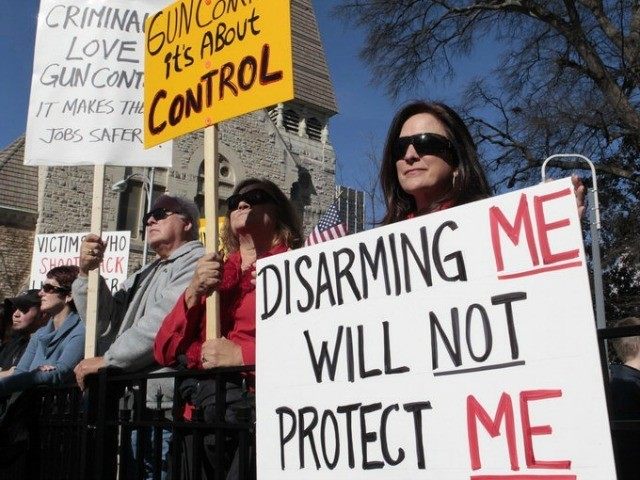On April 2, Mother Jones ran a column on debunked Harvard researcher David Hemenway’s new study, which claims more guns actually cause more crime and that guns are used in crime far more often than they are used in justifiable defensive settings. `
Ironically, Hemenway’s attempts to show guns are used more in crime than justifiable defense settings was first debunked in 1997, then “even more extensively in 1998 and 2001,” according to Politico Magazine.
Hemenway was doing his best to refute the work of Florida State University criminologist Gary Kleck, who, in 1993, showed that a minimal number of defense gun uses (DGUs) in the U.S. annually was approximately 760,000.
And Kleck made clear that 760,000 is a low estimate.
On February 17, 2015, Kleck reaffirmed these numbers and explained that no researcher has countered them with “empirical evidence.”
It is important to note that at 760,000 DGUs a year, justifiable defensive uses of a gun are many times higher than criminal uses of a gun annually.
For example, the Centers for Disease Prevention and Control reported “11,208 firearm homicides” in 2013. That’s 11,208 homicides with a firearm versus 760,000 DGUs.
But what about criminal gun uses where a life isn’t taken? The National Justice Institute reported “414,562” incidents of non-fatal criminal gun use in 2011. Even if we add the 11,208 homicides to this figure, raising it to 425,770, it is still far shy of the 760,000 DGUs by law-abiding citizens each year.
Yet according to Mother Jones, Hemenway’s new research claims criminal gun use is higher than defensive gun use.
How can Hemenway make such a claim in light of decades of Kleck’s work proving otherwise and in light of the fact that Hemenway’s earlier attempts to disprove Kleck were themselves debunked? The answer is simple: He does not rely on first-hand accounts but on articles written by “experts” in the fields of “public health, public policy, sociology, and criminology.”
He also polled these “experts” and found that “73 percent” of them reject the assertion that “guns are used in self-defense far more more often than they are used in crime.” (Only “8 percent” agreed with the assertion.)
Here’s a problem: this research methodology fails to do the one thing that must done if research on the relation between guns, crime, and defensive gun uses is to be accurate; namely, it fails to talk to real gun owners who may or may not have had to use guns to save their lives or the life of another while under criminal attack. Instead of doing this, Hemenway asked “experts” what they think.
An overwhelming number of these same “experts” told Hemenway a gun in the home makes the home a “more dangerous” place to be. However, in November 2014, Breitbart News reported a Gallup Poll that shows the findings are far different, when you ask average Americans this same question. In that poll, Americans who live it rather than pontificate about it said a gun makes the home safer by a margin of more than six out of ten.
Similarly, Hemenway’s experts tell him that more gun control–in the form of more background checks–is desirable because it will reduce crime. Yet a PEW Research Poll reported on December 10 shows that Americans who live it rather than pontificate about it are more concerned with defending gun rights than passing more gun control.
Moreover, Breitbart News has demonstrated empirically that background checks did not stop some of our nation’s more public and vile firearm crimes during the past six years. For example, Jerad and Amanda Miller (Las Vegas), Aaron Ybarra (Seattle Pacific University), Elliot Rodger (Santa Barbara), Ivan Lopez (Fort Hood 2014), Darion Marcus Aguilar (Maryland mall), Karl Halverson Pierson (Arapahoe High School), Paul Cincia (LAX), Aaron Alexis (DC Navy Yard), James Holmes (Aurora Theater), Jared Loughner (Tucson), Nidal Hasan (Fort Hood 2009), and Naveed Haq (Seattle), all went through background checks to get their firearms–then they committed their atrocities.
On top of these things, Hemenway’s experts said they believe suicide increases when a firearm is in the home. However, a previous Harvard-published study demonstrated that even total gun bans do not lower suicide rates. According to that study, “Nations with higher gun ownership rates…do not have higher murder or suicide rates than those with lower gun ownership.” Moreover, although Russia had an all-out handgun ban and a ban on numerous other guns at the time of the study, the “murder rate in gun-less Russia” was four times higher than the rate in the U.S., and the suicide rate was “about four times higher” as well.
Follow AWR Hawkins on Twitter @AWRHawkins. Reach him directly at awrhawkins@breitbart.com.

COMMENTS
Please let us know if you're having issues with commenting.